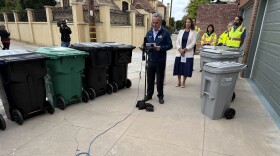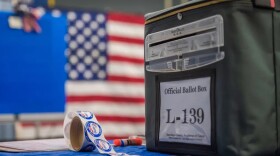Speaker 1: (00:00)
After a loss at the us Supreme court, the Biden administration has officially withdrawn its vaccine mandate for large businesses. The mandate would've applied to us firms with 100 employees or more requiring workers to receive COVID vaccinations or weekly COVID tests. The occupational safety and health adminis says the rule may return in some form, but that format has not been decided. Meanwhile, the CDC reports just 63% of eligible Americans have been fully vaccinated. Only 40% have received booster shots. Johnny me is legal analyst. Dan Eaton, Dan, welcome to the program.
Speaker 2: (00:39)
Good to be with you again, ma
Speaker 1: (00:41)
Now that's 63 Supreme court ruling against the vaccine. Mandate was pretty much the death nail for this rule, but the Supreme court allowed a vaccine mandate for healthcare workers and facilities that received federal funds. They allowed that to stand. So remind us why they did not allow the business vaccine mandate. The reason that
Speaker 2: (01:01)
This Supreme court reached a different ruling and the challenge to the Medicare Medicaid mandate requiring facilities who receive those fundings to have their staffs vaccinated, uh, is because it was a different law. One law does not fit all specifically what the court said is that agencies routinely condition the granted federal funds on adhering to certain terms that are set by, by the agency. The court actually towards the end of the Medicare Medicaid ruling said two sentences. That pretty much reconcile both rulings. It said the challenges posed by a global pandemic do not allow a federal agency to exercise power that Congress has not conferred upon it. Referring to the Osher ruling at the same time, such unprecedented circumstances provide no ground for limiting the exercise of authorities. The agency has long been recognized to have closed quote, in other words, different laws, different outcomes.
Speaker 1: (01:51)
So where does this leave us companies when it comes to requirements for COVID vaccines,
Speaker 2: (01:56)
Where it leaves us companies is that those companies that were, uh, struggling to get in line with the OSHA man to eight can stop because they don't have to mandate, uh, vaccines because this rule is no longer in place. Now private companies may still require, uh, vaccines on their own, but the death now of the Osher rule means they no longer have to. And I'm not aware of any state that require of large companies or companies of any size to mandate vaccines in limited industry circumstances
Speaker 1: (02:26)
On another topic here, San Diego unified and other school districts have run up against similar court rulings saying that they don't have the authority to impose COVID vaccine mandates for students. Now, a bill is being introduced in Sacramento to add COVID vaccines to the required school vaccination list. Is that likely to satisfy the legal challenges?
Speaker 2: (02:49)
Well, it's good to satisfy one aspect of legal challenges. And this gets to the point I made earlier about different laws, different outcomes. The issue in those school cases was that, uh, COVID 19 was not on the list of required vaccinations that the, uh, California legislature had enacted the California legislature is now going to change that by adding COVID 19, along with rubella and other diseases for which, uh, students, uh, and presumably staff have to get vaccinated again, different law, different outcome. That the difference in these cases is the source of law. And whether the government agency that's exercising, this authority really has it. What
Speaker 1: (03:25)
Could OSHA do to bring back some kind of worker safety requirements for COVID? Could they specify a vaccine mandate only for certain industries?
Speaker 2: (03:34)
Yes. And the Supreme court said as much it's that look there are going to be some workplaces where there were risk of COVID is, uh, especially problematic. And, and you can issue regulations on that. What you can do is issue this broad regulation that applies to 80 million, some people across industries, without regard to specific hazards that are represented by, uh, COVID 19, that actually cuts across all industries and outside of the workplace, it a public health crisis, not a workplace specific crisis. What kind
Speaker 1: (04:03)
Of precedent could the Supreme court ruling against vaccine mandates set for future decisions involving workplace health and safety. But
Speaker 2: (04:10)
That's the fascinating thing, Maureen. Now what the Supreme court has said is OSHA and by extension other federal agencies stay in your lane because if you go beyond the specific grant of congressional authority, with respect to the exercise of your power, we are going to block you from doing that. And that could mean that agencies are in issuing regulations are going to have to issue regulations, narrowly focused on their specific mandate of congressional power. And
Speaker 1: (04:36)
Finally, Dan, I know you're an avid court watcher. What's your take on today's news that one of the three liberal justices on the us Supreme court, Steven Brier is retiring.
Speaker 2: (04:47)
It's huge Maureen, and it's huge for a couple of reasons first because, uh, obviously justice Brier was one of three members of the what's called the liberal block and the judicial, not the political sense of that. And it gives the democratic president, Joe Biden opportunity to replace him. And he's going to replace it apparently with an historic appointment, which he promised to make of an African American woman. This is going to change the ideological composition of the court, but it means that one liberal justice who's the oldest member of the court is going to be replaced presumably by a much younger African American female, just for all the consequences that entails going forward in the decades to come. But
Speaker 1: (05:26)
The conservative liberal balances still six conservative three liberal justices.
Speaker 2: (05:32)
Yes, the, uh, conservative liberal balance is not going to change, except that the interesting about Supreme court appointments is that you never know what issues are going to crop up in the decades that a justice sits and you don't know whether those issues are going to be decided along traditional ideological lines. That's what makes court watching so much fun.
Speaker 1: (05:51)
I've been speaking with legal analyst, Dan Eaton, a partner with the San Diego law firm, melter Kaplan, McMann, and Vitech Dan as always thank you so much. Great to be with you,
Speaker 3: (06:00)
Maureen.






